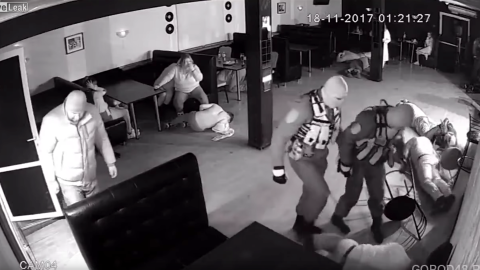You know who else has a problem with police brutality? Russia.

The growing spate of police brutality incidents in the United States lays bare the racial and socioeconomic tensions within our society. In 2017, the police killed 1,147 American citizens, according to the Mapping Police Violence report. Officers were charged with a crime in just 13 of these cases – about 1% of all killings. Considering the fact that a disproportionate number of those killed by the cops were people of color, and that the police spend 7 times as many hours training to shoot people than they do to de-escalate situations, it’s no surprise this situation calls for reform.
The problem is not limited by race, either, as this disturbing video of a New Jersey beachgoer getting pummeled by the police shows:
I was sleeping on the beach and I woke up to this.. i can’t believe it.. pic.twitter.com/UJE5Sy7E4G
— Lexy (@HewittLexy) May 26, 2018
The growing acknowledgment by the American public of the reality of police violence is beginning to mirror the way of life in Russia, a society which finds itself inextricably linked to the U.S. as its perennial opposite and where police brutality has been somewhat of a norm.
Almost one in four Russians say they have seen police attacks firsthand, with about 12.3% reporting being actual victims of police brutality. 21.8% have personally seen beatings by law enforcement personnel or, interestingly, doctors. And 28.6% of Russians heard of police brutality cases from family and friends. Such was the finding of a survey by the human rights organization "Public Verdict" and Moscow's Metodicheskaya Laboratoriya.
And we are not talking the police violence you might encounter at an anti-government protest or the growing violence against reporters in Russia. Extreme violence can be experienced in everyday situations like in this example from a 2017 police raid on a nightclub in the city of Yelets:
And here’s a collection of some situations you might find yourself in on a Russian road if you happen to cross the police -
How many people actually die at the hands of the Russian police is unclear as these statistics are not reported, but independent journalists estimate there were at least 197 police deaths just in police custody in 2015, likely due to widespread use of torture. And the situation has likely not changed. A recent and extremely infamous case involved a man who posted a YouTube video alleging police brutality right before leaping off a building to kill himself. He was tortured for a full day by various officers who wanted him to confess to crimes he didn’t commit.
While the U.S. is not Russia, it may be sliding down into the kind of society where law enforcement violence is an accepted fact of life. As examples go, the perception exists that President Putin essentially condones violent police enforcement and therefore that’s how it happens in the Russian society. If he didn’t want it, it would stop.
So far, President Trump has been extremely "pro-police" and did not offer much direction for improvement, to the point of being called “the Police Brutality President" for going so far as to openly call for the police to rough up suspects.
While states control their own police forces in the U.S., there is room to think that the federal government must set the tone for police behavior across the land. What is telling is that Russian media likes to show episodes of American police brutality as an example of societal decay. “To know your Enemy, you must become your Enemy,” said the ancient Chinese philosopher and general Sun Tzu. Let’s hope that is not what is happening now in the United States.





